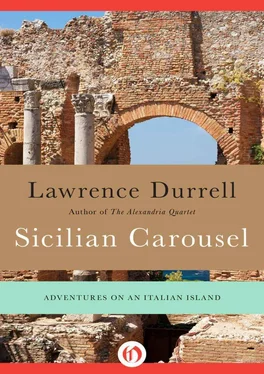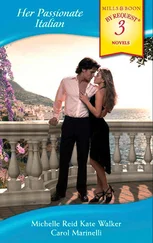So were rural areas resettled, inheritance laws revised, ancient waterways brought back into use for irrigation. They were planters of skill and choice; they brought in citrus, sugarcane, flax, the date palm, cotton, the mulberry with its silkworms, melon, papyrus, and pistachio. Nor was it only above ground for they were skillful miners and here they found silver, lead, mercury, sulphur, naphtha, and vitriol — not to mention alum and antimony. The extensive saltpans of today date from their inspired creative rule. But they also vanished within the space of a few decades — like water pouring away down a drain; the land took over once more, trying to form again its own obstinate image.
We were entering the throat of a plain which led directly into the mountains, and here I got a premonitory smell of what the valley of Agrigento must be like — it was purely Attic in the dryness, in the dust, and the pale violet haze which swam in the middle distance foxing the outlines of things. To such good effect that we found ourselves negotiating a series of valleys diminishing all the time in width as they mounted, and brimming with harvest wheat not all of which had yet been garnered. It is impossible to describe the degrees of yellow from the most candent cadmium to ochre, from discolored ivory to lemon bronze. The air was full of wisps of straw and the heat beat upon us as if from some huge oven where the Gods had been baking bread. I expected Argos to come in sight at any moment. What is particularly delicious to me about Attic heat is its perfect dryness — like a very dry champagne. You are hot, yes, you can pant like a dog for water; but you don’t sweat, or else sweat so very lightly that it dries at once on your skin. In such heat to plunge into an icy sea is marvelous — you get a sharp pain in the back of the throat as if from an iced wine. But here we were far from the sea, and starting to climb amidst all this glaze of peacock-blue sky and yellow squares of wheat. Underneath that hot heaven the sun rang as if on an anvil and we were glad of Mario’s cooling apparatus which sent us little draughts of cool air. Dust devils danced along the plain, and the few lorries we passed were powdered white — they had left the main roads for the country paths. Halfway up Roberto announced a “physiological halt” as he called it, and we pulled into a petrol station in order to fill up and, by the same token, to empty out.
There was a canteen where we had a few moments of quiet conviviality over wine and a strange white aperitif made from almond juice and milk. Like everything in Sicily it was loaded with sugar though a delicious drink when sufficiently iced. The Petremands stood treat and Mrs. Microscope was back in sufficient form to engulf a couple of glasses before Mario honked and we all trooped back to the bus to resume our ascent which was now to become a good deal more steep as we left the plain behind. It was pleasant to look down on it as it receded, for the sinuous roads curved snake wise in and out among the hills and the fine views varied with angle and altitude. We were heading for a Roman villa where quite recently the archaeologists had discovered a magnificent tessellated floor of considerable importance to them — and in consequence to us, the curious sightseers of the Carousel. We would base ourselves at Piazza Armerina in order to see the Villa Imperiale and have lunch before crossing the scarps and descending with the descending sun upon Gela and Agrigento. This gave us our first taste of the mountains and it was most refreshing. In one of the rock cuttings there were little tortoises clicking about and Mario stopped to allow Deeds to field one smartly and hand it to Miss Lobb who did not know what to do with it. It was an astonishingly active animal and ran all over the bus into all the corners, upsetting all of us and causing a full-scale hunt before it was caught. Finally she freed it. Its little claws were extremely sharp and it fought for dear life, for its freedom. I had always thought of tortoises as such peaceable things which simply turned into stones at the approach of danger. This little brute attacked all along the line and we were glad when at last it clicked off into the bushes.
Piazza Armerina is a pretty and lively little hill town, boasting of more than one baroque church, a cathedral and a castle, and several other sites of note in the immediate environs. But it is quite impossible to convey that elusive quality, charm, in writing — or even in photography which so often deludes one with its faked images and selected angles. The little town had charm, though of course its monuments could not compare in importance to many another Sicilian town. Yes … I found myself thinking that it would be pleasant to spend a month there finishing a book. The walking seemed wonderful among these green and flourishing foothills. But the glimpse we had of it was regrettably brief; having signaled our presence to the hotel where we were to have lunch we set off at once to cover the six or so kilometers which separated us from the Imperial Villa — a kind of summer hideout built for some half-forgotten Roman Emperor. What is intriguing is that almost no ascription ever made about a Sicilian site or monument is ever more than tentative: you would have thought that this important version of Government House. Everywhere would offer one a little firm history. No. “It has been surmised that this hunting lodge could have belonged to the Emperor Maximianus Heraclius who shared his Emperorship with Diocletian.” The site they chose for the Imperial Villa is almost oppressively hidden away; it makes one conjecture why in such a landscape one should plank down a large and spacious building in the middle of a network of shallow ravines heavily wooded, and obviously awash in winter with mountain streams. Instead of planting it on a commanding hillock which (always a problem in hill architecture) drained well during the rains. There was something rather unhealthy and secretive in the choice of a site, and it must be infernally hot in August as a place to live in. It buzzed with insects and butterflies. We arrived in a cleared space where, together with a dozen or so other buses, we dropped anchor and traipsed off down the winding walks to the villa, marveling at the sultriness and the oppressive heat — so different from the Attic valleys we had traversed with all their brilliant cornfields.
We came at last to a clearing where an absolute monstrosity greeted our eyes — a straggling building in dirty white plastic which suggested the demesne of a mad market gardener who was specializing in asparagus. I could not believe my eyes. None of us could. We stood there mumchance and swallowing, wondering what the devil this construction was. Roberto, blushing and apologetic, told us.
So precious were the recently uncovered mosaics and so great the risk that they would be eaten into by the climate that someone had had the brilliant idea of covering them in this grotesque plastic housing through which a series of carefully arranged plank walks and duckboards allowed the curious to walk around the villa. It was a groan-making thing to do and only an archaeologist could have thought of it. Moreover, the mosaics, so interesting historically that one is glad to have made the effort to see them, are of a dullness extraordinary. But then the sort of people who build villas for Governors are for the most part interior decorators with a sense of grandiose banality, a sense of the expensively commonplace. Of such provenance is the Imperial Villa, though of course the number and clarity of the decorations merit interest despite their poor sense of plastic power. Historians must be interested in these elaborate hunting scenes, the warfare of Gods, and the faintly lecherous love scene which ends in a rather ordinary aesthetic experience. And all this in a white plastic housing which turned us all the color of wax. Was this the pleasure dome of an Emperor, or was it perhaps (an intelligent suggestion by Christopher Kininmonth) more the millionaire’s hideaway, constructed for the rich man who purveyed animals for the Roman arenas? The frescoes of animals are so numerous and their variety so great that it makes one pause and wonder. But as usual there is no proof of anything.
Читать дальше











